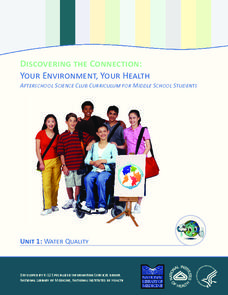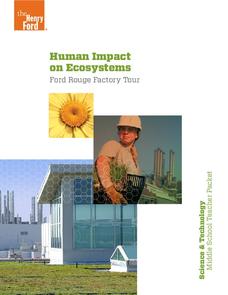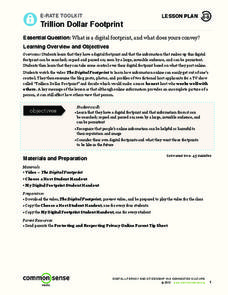Science 4 Inquiry
Levitation Engineers: Exploring Forces
Levitation tricks have been documented from the early 1900s, so how do they do it? Scholars learn about the force of magnetism in an attractive resource. They watch videos and design experiments to understand the strength and...
Science 4 Inquiry
Frenemies, Bros and Killers: A Lesson in Symbiosis
Animals and plants develop relationships and rely on each other to survive. Pupils learn more about symbiosis through a video, a hands-on matching activity, and a game. They differentiate and describe each type on a written evaluation.
Science 4 Inquiry
Phases of the Moon
The moon takes just over 27 days to orbit around Earth. Young scientists position themselves as the earth as they rotate around the sun and hold the moon. This allows them to observe the patterns and phases of the moon.
Science 4 Inquiry
Layers of the Earth
We can't dig a hole through the Earth, so how do we know about the layers beneath our feet? Scholars learn about layering through hands-on exploration of common materials. They study the characteristics of each layer and apply their...
Science 4 Inquiry
Journey Through the Spheres of the Earth
Each of the Earth's spheres interacts with the other spheres in predictable ways. Young scientists explore these interactions through a hands-on activity, graphing, and watching a video. They summarize their knowledge in a video or...
Science 4 Inquiry
It's Not All Visible
Electromagnetic waves travel though empty space, something no other wave type can accomplish. Young scientists learn more about the entire spectrum of electromagnetic waves. They sort cards and apply their knowledge to create models of...
Science 4 Inquiry
Edible Plate Tectonics
Many people think they can't observe plate tectonics, but thanks to GPS, we know that Australia moves at a rate of 2.7 inches per year, North America at 1 inches per year, and the Pacific plate at more than 3 inches per year! Scholars...
Science 4 Inquiry
Expanding the Universe
When Einstein first heard the theory of the expanding universe, he dismissed it as bad physics. Now scholars learn about the theory and how scientists prove it has merit. Through a hands-on simulation and videos, class members measure...
Science 4 Inquiry
An Investigative Look at Florida's Sinkholes
In May of 1981, the Winter Park Sinkhole in Florida first appeared and is now referred to as Lake Rose. Scholars learn about the causes of sinkholes through an inquiry project. Then, they analyze recent data and draw conclusions to...
Broadway GPS
The Lion King—The Broadway Musical Study Guide
Musicals have been adapted from stage plays, novels, and movies. With The Lion King, Disney transforms its animated film into show-stopping, live-action musical theatre. The guide Disney provides to accompany a study of the award-winning...
National Library of Medicine
Your Environment, Your Health: Air Quality
Some scientists argue that air pollution now causes more deaths than smoking. The second unit in a six-part series focuses on air quality. Scholars learn what's in the air, how clean the air around their school is, and what they can do...
National Library of Medicine
Your Environment, Your Health: Runoff, Impervious Surfaces, and Smart Development
Can a sidewalk increase the amount of pollution in local streams? Scholars learn the answer to this question though research and experimentation in the fifth unit in the six-part series. Pupils study runoff, impervious surfaces, and the...
National Library of Medicine
Your Environment, Your Health: Food Safety
Did youknow that chicken causes the greatest risk of food-borne illness. The fourth unit in a six-part series addresses food safety. Scholars research common scenarios of food causing illness through the National Institute for Health....
National Library of Medicine
Your Environment, Your Health: Chemicals in Your Home
Many people know about chemical pollution, but are all chemicals bad? The third unit in a series of six addresses chemicals common in everyday life. Scholars learn about the chemicals found in their own homes, chemical safety, and...
National Library of Medicine
Your Environment, Your Health: Water Quality
How important is water quality where you live? The first module in a six-unit series includes four lessons on water quality. By applying the concept directly to the lives of pupils, they engage in meaningful learning. They read about...
Cornell University
Buoyancy
Swimmers know to float by turning their bodies horizontally rather than vertically, but why does that make a difference? In an interesting lesson, scholars explore buoyancy and the properties of air and water. They test cups to see which...
PBS
Stories of Painkiller Addiction: Learning About Opioids
Feeling high is not the only side effect of abusing prescription opioids. Middle and high schoolers learn more about specific painkillers, including Fentanyl, Oxycodone, and Clonazepam, as well as their common brand names and extensive...
Cornell University
Energy Changes in Chemical Reactions
The heat of solution measures how much thermal energy a dissolving substance consumes or gives off. The experiment demonstrates both endothermic and exothermic reactions. Scholars dissolve several substances, measure the temperature...
Common Sense Media
Digital Compass
Time to make some real world decisions in an interactive digital citizenship game. Choose a story and help the characters make the right decisions regarding Internet safety, cyberbullying, copyright, media literacy, appropriate online...
New York City Department of Education
Egypt
This six-week unit encompasses all subjects with a focus study on world history and the development of ancient civilizations. As gifted and talented students dive into the interesting yet challenging topic of Egypt, they think critically...
Henry Ford Museum
Human Impact on Ecosystems
An environmenta science unit includes three lessons plus a cumulative project covering the ecosystem. Scholars follow the history of the Ford Rouge Factory from its construction on wetlands and how it destroyed the environment to its...
Common Sense Media
Cyberbullying: Crossing the Line
Teach pupils to identify different forms of cyberbullying, including harassment, deception, “flaming,” and threats to safety, as well as how to handle a situation in which cyberbullying might be involved.
Common Sense Media
Trillion Dollar Footprint
Learners explore their digital footprints, and discover how information they put online can easily be searched, copied, forwarded, and seen by a large audience.
Curated OER
Making Regolith
You may not be able to take a field trip to the moon, but that doesn't mean your class can't study moon rocks. Using graham crackers as the moon's bedrock and powdered donuts as micrometeorites, young scientists simulate the creation of...

























